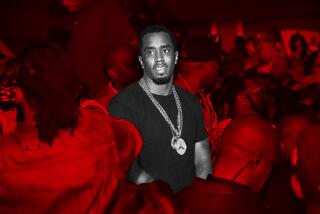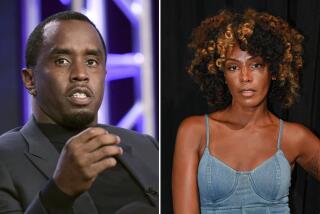Kesha, studio guru Dr. Luke exchange lawsuits
As a team, Kesha and Dr. Luke were platinum hitmakers. Today, the singer and producer are making news again, but not for their music.
The bitter rivals are suing each other, likely marking the end of one of pop’s most successful pairings in recent years.
In a 28-page suit filed in Los Angeles Superior Court this month, Kesha (born Kesha Rose Sebert) alleges a decade of sexual, physical and mental abuse by her producer.
Dr. Luke, born Lukasz Sebastian Gottwald, countered with a suit of his own claiming that his onetime protégé, her mother and manager are using outlandish claims to extort money and get out of her recording and publishing contract.
Kesha rose to pop stardom with boozy party anthems such as “Tik Tok,” “Your Love Is My Drug” and “Die Young.” Producer Dr. Luke was behind those hits and dozens more from Britney Spears, Rihanna, Katy Perry, Kelly Clarkson and others.
Contentious legal battles between singers and their labels or management are nothing new. John Fogerty directed the songs “Zanz Kant Danz” and “Mr. Greed” at Fantasy Records’ Saul Zaentz after the label chief sued him, claiming he was recycling old Creedence Clearwater Revival hits for his solo career. Prince infamously scrawled “slave” on his face during a dispute with Warner Bros., and R&B singer JoJo claimed her label held her music hostage for seven years in a recent suit.
But the music industry has yet to see a case like this.
According to Kesha’s account, on one occasion, “Dr. Luke instructed Ms. Sebert to take what he described as ‘sober pills.’ ... Ms. Sebert took the pills and woke up the following afternoon, naked in Dr. Luke’s bed, sore and sick with no memory of how she got there.” The suit continues with similar claims dating to when she was 18.
Gottwald, in turn, responded with a suit naming Kesha along with her mother, Pebe Sebert, and the singer’s management, claiming defamation and breach of contract. In a lengthy statement, his attorney alleges that the singer and her mother began an extortion scheme more than a year ago and that settlement talks had been in place before their suits.
“Kesha’s lawsuit is a spectacular and outrageous fiction that will go down in flames,” wrote Gottwald’s attorney, Christine Lepara. “As the truth emerges, this sad and misguided smear campaign will only hurt Kesha. This is hardly the first time that Kesha and her mother have threatened Luke with an extortionist scheme to ruin his reputation publicly unless he let her out of her contract.”
Kesha is represented by Mark Geragos, the high-profile attorney whose clients have included Michael Jackson and Scott Peterson, the Modesto man convicted of killing his wife and unborn son. In an interview, Geragos said there would be no reason for Kesha to file suit if the allegations were not true.
“You have to ask yourself the question: If none of this happened and she’s at her height of fame and fortune, why do this?” he said.
Born in Los Angeles, Kesha grew up in Nashville, where her mother was pursuing a songwriting career, co-writing “Old Flames Can’t Hold a Candle to You,” recorded by Dolly Parton. She would later collaborate on songs with her daughter as well.
While Kesha was in high school, she got her first taste of the spotlight when her mom answered a casting call for their family to host Paris Hilton and Nicole Richie on an episode of their reality show “The Simple Life.” But her first real break came when her demo made its way to BMI’s Samantha Cox, who passed it along to the then-rising pop producer Gottwald.
Gottwald persuaded Sebert to move to L.A., where after briefly being managed by the firm DAS (which later sued her for breach of contract), he signed her to a six-album deal through his Kemosabe Records imprint and his music publishing company Prescription Songs. She sang backing vocals on Spears’ “Lace & Leather” and appeared, uncredited, on Flo Rida’s 2009 single “Right Round,” which Gottwald produced.
A guitarist with the “Saturday Night Live” band from 1997 to 2007, Gottwald earned label attention from hip-hop remixes and music he was making with a DJ called Liquid Todd. But after meeting Swedish über producer-songwriter Max Martin he made inroads with pop audiences. The two began crafting songs together in 2004, and Clarkson’s “Since U Been Gone” was their first smash. Today, more than 35 Top 10 hits feature Gottwald’s production credits, but his success reached new heights with Kesha.
Her 2010 album “Animal” — which he oversaw — included the hit single “Tik Tok,” an unapologetic ode to hard partying that featured a frenetic electronic production from Gottwald. It set what was then a single-week sales record for a female solo artist, selling more than 600,000 copies.
“Animal” and its companion EP, “Cannibal,” yielded four subsequent Top 10 hits, including the No. 1 single “We R Who We R.” Kesha co-wrote every track of the album and eventually proved her mettle as a collaborator, co-writing the Spears hit “Till the World Ends.”
Anticipation was high for her 2012 follow-up album, “Warrior,” preceded by the single “Die Young.” The song quickly hit No. 2 on the charts, but after the tragedy at Sandy Hook Elementary School, where 20 children were massacred by a gunman, many radio stations dropped the track, which included such lyrics as “Let’s make the most of the night like we’re gonna die young.”
In response, Kesha took to Twitter to say she had misgivings about the lyrics. “I had my very own issue with ‘die young’ for this reason. I did NOT want to sing those lyrics and I was FORCED TO,” she wrote (the tweet was eventually deleted). Other singles from the project failed to catch on with pop radio.
In 2013, a short-lived MTV documentary series, “My Crazy Beautiful Life” (on which Gottwald served as an executive producer), also raised the curtain on some of Kesha’s frustrations with creating music.
“My record label has final say on what songs make the album,” she said on the show. “I want to make music that’s different, but I’m just second-guessing everything I write. … I can’t just write party songs forever.”
By the end of the year, Kesha’s fans began circulating an online petition calling for the singer to be freed from Gottwald.
Kesha’s stint in rehab this year for an eating disorder revealed further signs of a rift, with her mother naming Gottwald as the catalyst. “Dr. Luke told a friend of ours he thought she looked like a refrigerator on her latest video, and could she please try to control her weight,” Pebe Sebert told People magazine.
In the case’s latest twist, Gottwald’s attorneys last week pointed to a deposition from a previous case in which Kesha and Gottwald were both being sued for breach of contract by her former management company.
In the deposition, the singer was asked, “Did Dr. Luke ever give you a roofie (short for the sedative Rohypnol)?” The singer answered “no” and later said “Dr. Luke never made sexual advances at me.”
Geragos responded that Kesha made those statements under duress. “Luke walked Kesha down the beach and threatened to destroy Kesha’s life and the lives of her family if she didn’t cover up his sexual assaults,” he said.
Attorney Evita Kaigler, who represents neither side, said she would not be surprised if the case is settled out of court, given the potential for a messy discovery process to damage the careers of both singer and producer.
“There’s too much room for more damage,” Kaigler said. “Once you go to court you have witnesses and documents and it becomes public knowledge — and that’s a problem.”
Times staff writer August Brown contributed to this story.
More to Read
The biggest entertainment stories
Get our big stories about Hollywood, film, television, music, arts, culture and more right in your inbox as soon as they publish.
You may occasionally receive promotional content from the Los Angeles Times.











